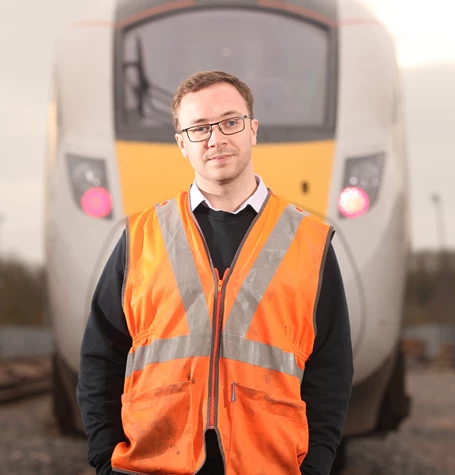Ryan Haycock is Head of Validation in our London office. Having spent the last fifteen years assessing the safety of train design, he has obtained in-depth knowledge on rail safety and the essential skills needed in the sector.
I was initially inspired by my grandfather, who was an Engineer, and then developed a passion for STEM subjects at school. After A-Levels, I took the decision to apply for an advanced apprenticeship at Hitachi Rail. My three-year apprenticeship combined academic learning with hands-on work alongside maintenance teams.
Following the successful completion of my apprenticeship, I was promoted to the role of Maintenance Engineer at Hitachi Rail. This experience laid the foundation for my career in Engineering and nurtured my appreciation for the field’s profound impact on transportation and sustainability.
I really believe in the importance of exposure to new industries. A lot of young professionals do not know which career to follow, but they should get as much information as they can from school, university or their local community. I think my journey mirrors that sentiment, since I began with a general interest in Engineering then benefitted from a local skills-based course.
In 2014, I was able to move from a role in Engineering to Testing, through an internal job posting. I joined the Intercity Express Programme (IEP) Testing Team and learned about a key part of the design process which helps assess and measure the reliability and safety of new trains. From there, I continued to work on projects for TransPennine Express, Hull Trains and East Midlands Rail.
When I was promoted to Senior Test Engineer, I surveyed the overall quality assurance of testing. This culminated in the delivery of the Great Western IEP service, helping the team achieve the authorisation required to place the trains into service. One of my most memorable experiences was testing a train that Queen Elizabeth came to visit.
"In the UK, we need to prove to the government, the operator, the ROSCO and independent engineering bodies that the train is safe and fit for passenger service. This requires robust technical tests of all aspects that comprise the train – from the brakes to the electromagnetic emissions we emit on to the railway infrastructure."
The learning trajectory behind a career in rail safety testing
Extensive training is required to understand the complex product and the various technical approaches to testing and collecting accurate, meaningful, and reliable data. Test engineers receive training in using bespoke systems for data collection and analysis, covering topics like data analysis techniques, sampling, filtering and much more.
Ryan mentioned that their number one priority was always safety, and they worked diligently to address the issues they faced. The test team was part of the delivery team that was awarded the Hitachi “Harmony” Award as part of East Coast introduction within the Intercity Express Programme.
Hitachi Rail have introduced me to some excellent opportunities for development, including an MBA. My thesis led me to understand gender inequality within railway engineering field. It highlighted the multifaceted nature of gender inequality. I address this issue by encouraging girls to pursue STEM subjects in presentations at local schools.
My journey into engineering and testing through an apprenticeship can be taken as an inspiration to young professionals, both men and women! I encourage young professionals to consider apprenticeships as an equally effective route into the rail sector as university degrees.
Click here to find out about our Graduate and Apprenticeship programmes.


